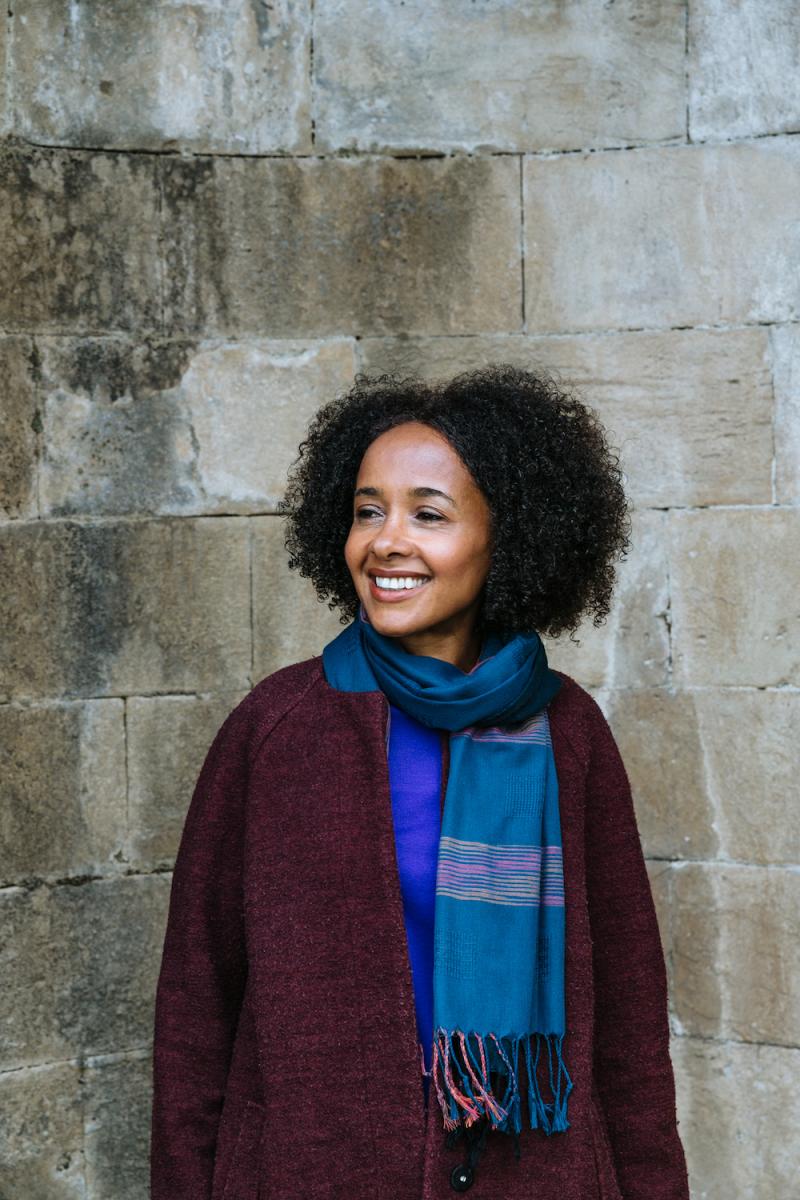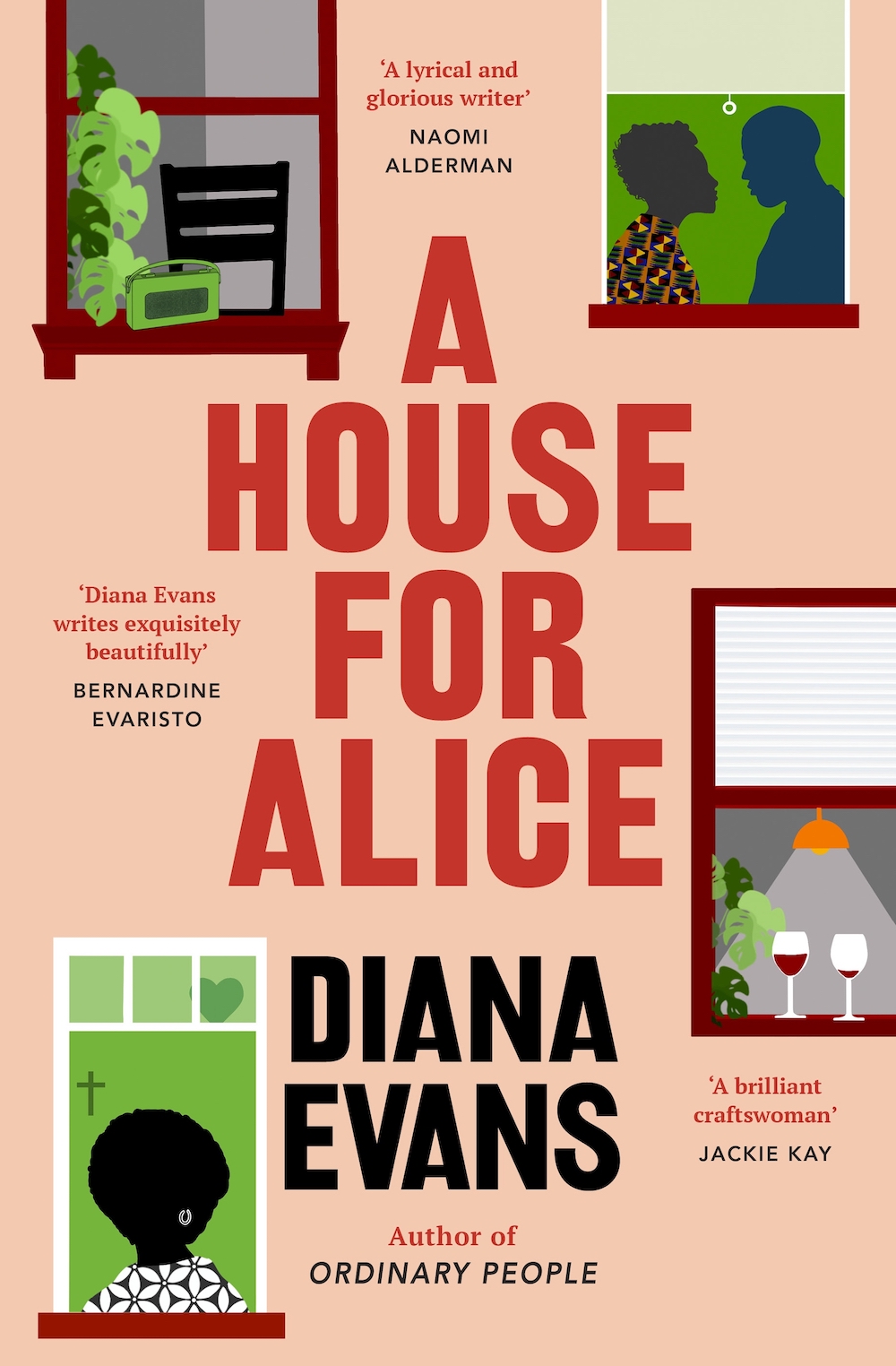Diana Evans: A House for Alice review - lyrical sequel to Ordinary People | reviews, news & interviews
Diana Evans: A House for Alice review - lyrical sequel to Ordinary People
Diana Evans: A House for Alice review - lyrical sequel to Ordinary People
Diana Evans's compelling fourth novel reprises the lives of black Londoners

Diana Evans specialises in houses, their baleful quirks and the meaning of home. In her acclaimed third novel, Ordinary People (2018), formerly happy, black couple Melissa and Michael live in a crooked, malevolent Victorian terraced house in south London – the address is Paradise Row – where Melissa, struggling to cope after the birth of her second child, feels that the “floorboards were like a demon presence”.
It comes as a relief in some ways to find, in this equally compelling sequel, that they’re no longer in that haunted house. But they’re separated, even though they’re still deeply connected, not just because of their children, astute Ria, now a teenager, and hilariously talkative Blake, aged eight. Melissa “must have done something irreparable to him,” thinks Michael. “He was programmed in her algorithm. How long exactly would it take for her to fade?”
Their relationship plays out against the background of the Grenfell fire, Brexit and the hostile environment. Rage against injustice, racial and otherwise, is never far off. But it's tempered by the longing you feel for this superbly sensitively drawn, well-matched couple to reunite. But will they? Michael is now married to mega-sociable party-girl Nicole, a singer, who has such “high entertainment requirements” that he sometimes wonders if he’s also married “the rare groove funky house raving communities of South London” who take up space in their house on a Saturday morning when he craves peace and quiet. (Music is an important theme for Evans – Ordinary People even has its own playlist, with John Legend featuring heavily as Michael's romantic choice.)
So many of them, all dressed up to watch Harry and Meghan’s wedding on TV. “The room was in a state of mass captivation. Rastafarian follicular custom in the vicinity of the British monarchy. Never before seen on Earth…” But Michael is unimpressed, thinking more about the obscene cost and the hiding of the homeless.
 In Ordinary People, Melissa’s parents were minor characters. Here, her Nigerian mother, Alice, comes into focus: after the death of her tyrannical, possibly abusive husband Cornelius in a fire in his house (she left him some years previously) on the same night that Grenfell burnt down, she’s more determined than ever to build herself a house in Benin, her birthplace, planning to return there to live when she’s “tired enough”.
In Ordinary People, Melissa’s parents were minor characters. Here, her Nigerian mother, Alice, comes into focus: after the death of her tyrannical, possibly abusive husband Cornelius in a fire in his house (she left him some years previously) on the same night that Grenfell burnt down, she’s more determined than ever to build herself a house in Benin, her birthplace, planning to return there to live when she’s “tired enough”.
This decision divides her three daughters, whose relationships, and those of their children, are more intricately interwoven than in the previous novel. Carol, the eldest, is all for it, Adel, who’s in charge of sending money to the builders, seems strangely opposed while Melissa, the youngest, caught in the middle as usual, tries to remain neutral, knowing she’d miss her mother terribly, as well as her eba with stew, if she left. And, anyway, how can Alice contemplate leaving her children and grandchildren behind? “She was a paradox of adoration and disconnection, love and indifference.” Her mother's disconnection may have contributed to Melissa's disturbing flashbacks of being shut in a cupboard under the stairs and her father's hot breath on her neck. "In some way she felt she was still living in that house, her father's house, and it in turn was living inside her, directing her thoughts..."
Evans’s tone can be a little declamatory and her description of Melissa’s job as a freelance subeditor for Condé Nast – phone conversations with contributors about comma splices? – falls wide of the mark, but these are minor quibbles. She’s wonderful at capturing the atmosphere of specific London routes, and at charting a complicated family dynamic.
The house-proud Stephanie and her husband Damian (he and Melissa had an ill-fated night together when the couples were on holiday in Ordinary People) have been on shaky ground for a while. Feeling hemmed in, Damian has left Stephanie and their three kids, hoping vaguely to live a more authentic life, perhaps on a sort of sabbatical, but not reckoning on the pragmatic Stephanie’s understandable lack of enthusiasm to help him in his quest. For her, what’s over is done.
Now his life is all about lawyers and fortnightly access. His miserable solo flat is not what he’d dreamt of. He wishes he could still talk to Michael, but they’re estranged after the debacle with Melissa. His decision to leave has a tragic impact on his teenage daughter, Avril, who is haunted by a “quiet scream” that she started hearing when she was about six. “It began in a high pitch which sounded like anything she had ever been scared of was gathered together in song…” She tries to combat the quiet scream by leaving school before GCSEs and getting a job in an Italian café in Dorking. Her mother thinks she’s eating for free at the café, but no. In fact she’s hardly eating at all, allowing herself a pineapple juice “if she felt deserving”. Damian, who is much closer to her than Stephanie – Avril says she’d rather live with him – realises she’s too thin but by then it’s too late.
The search for a homeland is not simple. What if the house in Benin, wonders Alice, is only a product of the loneliness she and Cornelius had made of their marriage? Has she really escaped Cornelius now he’s dead? Or will his spirit find her in Benin? Evans is adept at skewering the loneliness inherent in every relationship, but she never loses a transcendent sense of strangeness and wonder.
- A House for Alice by Diana Evans (Chatto & Windus, £18.99)
- More book reviews on theartsdesk
rating
Explore topics
Share this article
The future of Arts Journalism
You can stop theartsdesk.com closing!
We urgently need financing to survive. Our fundraising drive has thus far raised £49,000 but we need to reach £100,000 or we will be forced to close. Please contribute here: https://gofund.me/c3f6033d
And if you can forward this information to anyone who might assist, we’d be grateful.

Subscribe to theartsdesk.com
Thank you for continuing to read our work on theartsdesk.com. For unlimited access to every article in its entirety, including our archive of more than 15,000 pieces, we're asking for £5 per month or £40 per year. We feel it's a very good deal, and hope you do too.
To take a subscription now simply click here.
And if you're looking for that extra gift for a friend or family member, why not treat them to a theartsdesk.com gift subscription?
more Books
 'We are bowled over!' Thank you for your messages of love and support
Much-appreciated words of commendation from readers and the cultural community
'We are bowled over!' Thank you for your messages of love and support
Much-appreciated words of commendation from readers and the cultural community
 Elizabeth Alker: Everything We Do is Music review - Prokofiev goes pop
A compelling journey into a surprising musical kinship
Elizabeth Alker: Everything We Do is Music review - Prokofiev goes pop
A compelling journey into a surprising musical kinship
 Natalia Ginzburg: The City and the House review - a dying art
Dick Davis renders this analogue love-letter in polyphonic English
Natalia Ginzburg: The City and the House review - a dying art
Dick Davis renders this analogue love-letter in polyphonic English
 Tom Raworth: Cancer review - truthfulness
A 'lost' book reconfirms Raworth’s legacy as one of the great lyric poets
Tom Raworth: Cancer review - truthfulness
A 'lost' book reconfirms Raworth’s legacy as one of the great lyric poets
 Ian Leslie: John and Paul - A Love Story in Songs review - help!
Ian Leslie loses himself in amateur psychology, and fatally misreads The Beatles
Ian Leslie: John and Paul - A Love Story in Songs review - help!
Ian Leslie loses himself in amateur psychology, and fatally misreads The Beatles
 Samuel Arbesman: The Magic of Code review - the spark ages
A wide-eyed take on our digital world can’t quite dispel the dangers
Samuel Arbesman: The Magic of Code review - the spark ages
A wide-eyed take on our digital world can’t quite dispel the dangers
 Zsuzsanna Gahse: Mountainish review - seeking refuge
Notes on danger and dialogue in the shadow of the Swiss Alps
Zsuzsanna Gahse: Mountainish review - seeking refuge
Notes on danger and dialogue in the shadow of the Swiss Alps
 Patrick McGilligan: Woody Allen - A Travesty of a Mockery of a Sham review - New York stories
Fair-minded Woody Allen biography covers all bases
Patrick McGilligan: Woody Allen - A Travesty of a Mockery of a Sham review - New York stories
Fair-minded Woody Allen biography covers all bases
 Howard Amos: Russia Starts Here review - East meets West, via the Pskov region
A journalist looks beyond borders in this searching account of the Russian mind
Howard Amos: Russia Starts Here review - East meets West, via the Pskov region
A journalist looks beyond borders in this searching account of the Russian mind
 Henry Gee: The Decline and Fall of the Human Empire - Why Our Species is on the Edge of Extinction review - survival instincts
A science writer looks to the stars for a way to dodge our impending doom
Henry Gee: The Decline and Fall of the Human Empire - Why Our Species is on the Edge of Extinction review - survival instincts
A science writer looks to the stars for a way to dodge our impending doom
 Jonathan Buckley: One Boat review - a shore thing
Buckley’s 13th novel is a powerful reflection on intimacy and grief
Jonathan Buckley: One Boat review - a shore thing
Buckley’s 13th novel is a powerful reflection on intimacy and grief
 Help to give theartsdesk a future!
Support our GoFundMe appeal
Help to give theartsdesk a future!
Support our GoFundMe appeal

Add comment